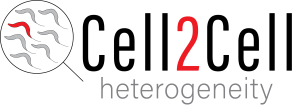Imaging 1:
- Immunofluorescence microscopy
NGS 1:
- Preparation of RNA-seq library
Data analysis 1:
- Including the right controls
Transferable skills 1:
- Project & Self-Management
- Research Integrity & Responsible Research
- Open Science: EC policy & FAIR principles
- Gender Equality & Gender Dimension
Starting from November 2020 and till October 2021, Cell2Cell organized a weekly lecture series. Every week a different topic was presented by one of our supervisors (main supervisors and partners) and by external Principal Investigators (PIs) as well. The lectures focused on topics relevant to Cell2Cell such as chromatin biology, bioinformatics, parasitology, and career path.
Lecture series – Part 1 (02.11.2020 – 15.02.2021)
Lecture |
Presenter |
Title |
| 1 | Naama Barkai,
Weizmann Institute of Science, Rehovot |
Chromatin-based heterogeneity in stress response |
| 2 | Jane Mellor,
Oxford University, Oxford |
Assessing Cell to Cell Variation using smRNA FISH: From smRNA FISH to a mathematical model for gene expression: how antisense transcription modulates chromatin structure to increase noise |
| 3 | Richard Bartfai,
Radboud University, Nijmegen |
Epigenetic memoirs of a parasite |
| 4 | Luisa Figueiredo,
iMM, Lisbon |
Tissue tropism in the mammalian host |
| 5 | Maria Colome Tatche,
Helmholtz Center Munich, Munich |
Single-cell computational epigenomics to quantify population heterogeneity |
| 6 | Sigurd Braun,
LMU Munich, Munich |
Put the periphery into the focus: spatial control of silent chromatin |
| 7 | Till Voss,
Swiss TPH, Basel |
Epigenetic regulation of sexual commitment in the malaria parasite Plasmodium falciparum |
| 8 | Magda Bienko,
Karolinska Institutet, Stockholm |
Illuminating Genome Organization through Integrated Microscopy and Sequencing |
| 9 | Angela Taddei,
Institut Curie, Paris |
How to whip the genome into shape? Compartmentalization and dynamics of heterochromatin and repair factors in the yeast nucleus |
| 10 | Ugur Sezerman,
Epigenetiks, Istanbul |
Applications of AI in Personalized Medicine |
| 11 | Robert Schneider,
Helmholtz Center Munich, Munich |
Regulation of gene induction and repression in individual cells |
| 12 | Nicolai Siegel,
LMU, Munich |
The benefit of being different: understanding cell-to-cell heterogeneity in pathogens |
| 13 | Balint Szabo,
Cellsorter, Budapest |
Robotic single-cell isolation on a microscope |
Lecture series – Part 2 (01.03.2021 – 03.05.2021)
Lecture |
Presenter |
Title |
| 14 | Keisuke Goda,
University of Tokyo, Tokyo |
Intelligent Image-Activated Cell Sorting |
| 15 | Clarissa Nobile,
University of California, Merced |
Candida albicans biofilms: tales of basic science to translation |
| 16 | Nao Nitta,
K.K. CYBO, Tokyo |
Moving from the Lab to the Market: CYBO’s Challenge to Innovate Cell Analysis |
| 17 | Bassem Al-Sady,
University of California, San Francisco (UCSF) |
Examining the dynamics of epigenetic domains in single cells |
| 18 | CJ Fitzsimons,
Leadership Sculptor, Heidelberg |
Leadership Launch: Career Path |
| 19 | Alexander Brehm,
University of Marburg, Marburg |
ATP-dependent chromatin remodelers and RNA |
| 20 | Sandra Hake,
Justus-Liebig-University, Giessen |
Career in science: a very personal view |
Lecture series – Parasitology (21.06.2021 – 19.07.2021)
Lecture |
Presenter |
Title |
| 1 | Danae Schulz,
Harvey Mudd College, Claremont |
Immune Evasion inTrypanosomatids |
| 2 | ||
| 3 | Shruthi Vembar,
Institute of Bioinformatics and Applied Biotechnology, Bengaluru |
Gene regulatory mechanisms governing Plasmodium development and stage transitions |
| 4 | Regulation of Toxoplasma developmental switches through transcriptional rewiring |
Lecture series – Chromatin Biology (27.09.2021 – 17.10.2021)
Lecture |
Presenter |
Title |
| 1 | Ritwick Sawarkar,
University of Cambridge |
Cellular response to stress: a chromatin perspective |
| 2 | ||
| 3 | Claudia Keller Valsecchi,
Institute of Molecular Biology Mainz (IMB), Mainz |
Evolutionary and pathological aspects of gene dosage alterations |
| 4 | Cis-acting non-coding RNAs and X chromosome dosage compensation |
Imaging 2:
- RNA & DNA FISH
Data analysis 2:
- Analysis of FISH data
Transferable skills 2:
- Scientific thinking
- Scientific writing (1)
- Microbial Pathogens
Data analysis 3:
- Analysis of NGS data
Transferable skills 3:
- IPR (I): Technology transfer & Patenting
- Entrepreneurship: From idea to industry
Date: From Sunday, April 3rd till Friday, April 8th, 2022
Location: in Sesimbra, Portugal
More information can be found here
Imaging 3:
- High throughput analysis
NGS 2:
- scRNA-sequencing
Data analysis 4:
- scRNA data analysis
Transferable skills 4:
- IPR (II): Exploitation
- Scientific writing (2)
- People Management
Imaging 4:
- High throughput analysis
NGS 3:
- Microfluidics
Data analysis 5:
- Review of key aspects, Q&A
Career day:
- Career Paths in academia, industry, and patent law
- Job Applications: Job talks & feedback
Click here to add your own text

This project has received funding from the European Union’s Horizon 2020 Research and Innovation programme under the Marie Skłodowska-Curie grant number 860675.
